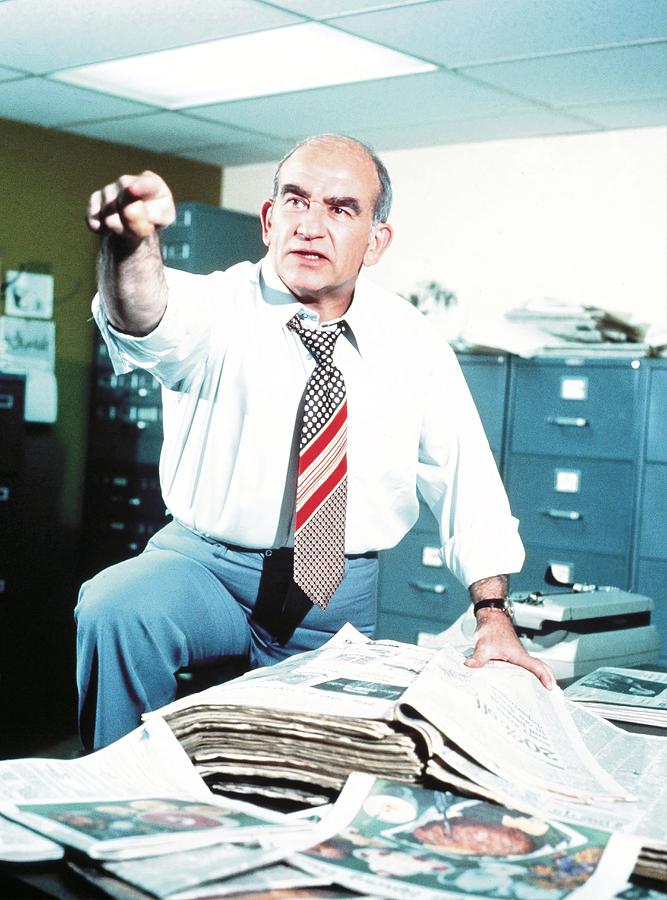KOJAK YOUR ENTHUSIASM (21)
By:
June 9, 2022
One in a series of 25 enthusiastic posts, contributed by 25 HILOBROW friends and regulars, on the topic of our favorite TV shows of the Seventies (1974–1983).

LOU GRANT | 1977–1982
When the Northeastern Blackout struck in August, 2003, I was an editor at a large metropolitan daily in Toronto. The scenes of that night stand out from all my newspaper days, maybe even more so than the week of 9/11. It was certainly more romantic. People navigated newsrooms by flashlight and candles while others went to the basement to find the backup generators; reporters were phoning in from the streets, or running in and out with notebooks flapping; staff clustered in the Business section where the main generator (predictably) was situated; we transcribed and edited copy, praying it would somehow transmit to the printers intact. Seeing the physical paper the next morning was like receiving a modest decoration for meritorious service.
During the first long lockdown of the pandemic in 2020, one of the diversions I came up with was to watch all of Lou Grant, the 1977–1982 CBS drama with Ed Asner (who died last year at age 91) as the city editor of a large metropolitan daily in L.A. My recall of its original run was fragmented, as my parents seldom let me stay up to watch. But it had made an impression. I most vividly remembered one about the managing editor’s son becoming a Hare Krishna — counterintuitively for the cult-panicked 1970s, the show sided with the college kid’s right to make his own dumb choices. But Lou Grant was much more than issue-of-the-week themes; its meat was in the debates among its devoted, smart, but flawed journalist characters over what to cover and how. Like a lot of my favorite things in art and politics, it was above all about process, a “procedural” in the most literal sense.
I returned to it because after many years of freelancing and in the heightened isolation of the pandemic, I was lonesome for a newsroom. And even across eras, the brown polyester spirit of Lou Grant proved remarkably true to my own experiences, allowing for dramatic license. In fact, in the midst of my 114-part marathon — the equivalent of roughly two full workweeks — I hit a third-season episode called “Blackout” that turned out to mirror my own paper’s August night in 2003. The practical dilemmas and enveloping mood and underlying thrill were the same, obvious technological shifts aside. Lou Grant had foretold my future.
In a larger sense, I’d already known that. Though the sentiment was ambient in those post-Watergate years, more than any other single influence it was Lou Grant that made it seem so enticing to be a “newspaperman” — or woman, as made clear by the prominent presence of Linda Kelsey as low-key-feminist reporter Billie Newman, and Nancy Marchand (yes, the future Mama Soprano) as the patrician but principled publisher Mrs. Pynchon. In an Emmy Foundation interview, former MTM studio head Grant Tinker rightly claims that Lou Grant remains the only critically and commercially successful media-based drama in U.S. TV history, in contrast with the many sitcoms. The not-so-hidden key was the grouchy-but-tender Asner’s migration in the title role from one of those sitcoms, Mary Tyler Moore, bringing some of its massive audience with him — the only actor ever to win Emmys for playing both comic and dramatic versions of the same character. And union organizer and political activist Asner’s own intelligence and integrity seemed to be infused into the show.
Notoriously, those factors also sealed Lou Grant’s ultimate fate. As the American zeitgeist U-turned under Reaganism, CBS allegedly tired of viewer and advertiser complaints about Asner’s off-screen stances on El Salvador and other issues and abruptly cancelled it. In the final moments of the final episode, it really feels as if somebody cut out the lights mid-story. Unlike in the blackout, they would never turn back on. Given the state of newspapers today, that too was a kind of prophesy.
KOJAK YOUR ENTHUSIASM: INTRODUCTION by Josh Glenn | Lynn Peril on ONE DAY AT A TIME | Dan Reines on THE WHITE SHADOW | Carlo Rotella on BARNEY MILLER | Lucy Sante on POLICE WOMAN | Douglas Wolk on WHEW! | Susan Roe on THE LOVE BOAT | Peggy Nelson on THE BIONIC WOMAN | Michael Grasso on WKRP IN CINCINNATI | Josh Glenn on SHAZAM! | Vanessa Berry on IN SEARCH OF… | Mark Kingwell on BATTLESTAR GALACTICA | Tom Nealon on BUCK ROGERS | Heather Quinlan on LITTLE HOUSE ON THE PRAIRIE | Adam McGovern on FAWLTY TOWERS | Gordon Dahlquist on THE STREETS OF SAN FRANCISCO | David Smay on LAVERNE & SHIRLEY | Miranda Mellis on WELCOME BACK, KOTTER | Rick Pinchera on THE MUPPET SHOW | Kio Stark on WONDER WOMAN | Marc Weidenbaum on ARK II | Carl Wilson on LOU GRANT | Greg Rowland on STAR TREK: THE ANIMATED SERIES | Dave Boerger on DOCTOR WHO | William Nericcio on CHICO AND THE MAN | Erin M. Routson on HAPPY DAYS. Plus: David Cantwell on THE WALTONS.
JACK KIRBY PANELS | CAPTAIN KIRK SCENES | OLD-SCHOOL HIP HOP | TYPEFACES | NEW WAVE | SQUADS | PUNK | NEO-NOIR MOVIES | COMICS | SCI-FI MOVIES | SIDEKICKS | CARTOONS | TV DEATHS | COUNTRY | PROTO-PUNK | METAL | & more enthusiasms!
